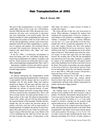 22 citations,
March 2000 in “Clinics in Dermatology”
22 citations,
March 2000 in “Clinics in Dermatology” Many treatments for hair loss lack proper testing and FDA approval, so their effectiveness is uncertain.
 16 citations,
September 2018 in “Journal of Ethnopharmacology”
16 citations,
September 2018 in “Journal of Ethnopharmacology” Plant-based remedies may treat hair loss by reducing inflammation and improving insulin resistance.
 5 citations,
September 2016 in “Journal of Cosmetic Dermatology”
5 citations,
September 2016 in “Journal of Cosmetic Dermatology” Nourkrin® with Marilex® may increase hair count by 35.7% in postpartum hair loss.
[object Object]  2 citations,
September 2016 in “Drug and therapeutics bulletin”
2 citations,
September 2016 in “Drug and therapeutics bulletin” Treating hidradenitis suppurativa needs long-term care and teamwork among doctors, but there's a lack of strong guidance on how to do it.
 1 citations,
January 2019 in “Springer eBooks”
1 citations,
January 2019 in “Springer eBooks” Hidradenitis Suppurativa is a chronic skin condition best treated early with surgery for better outcomes and less recurrence.
 1 citations,
March 2011 in “Infertility”
1 citations,
March 2011 in “Infertility” Hormone imbalances from the pituitary, thyroid, and adrenal glands can cause infertility, but treating these disorders can improve fertility.
 January 2019 in “Springer eBooks”
January 2019 in “Springer eBooks” Acne is linked to inflammation and insulin resistance, and is associated with various syndromes that require different treatments.
 July 2018 in “Elsevier eBooks”
July 2018 in “Elsevier eBooks” Acne keloidalis nuchae is a chronic skin condition more common in African men, causing itchy or painful bumps and can lead to permanent hair loss if not treated early.
[object Object]  December 2016 in “British Journal of Dermatology”
December 2016 in “British Journal of Dermatology” The meeting highlighted the importance of genetic testing and multidisciplinary approaches in pediatric dermatology.
 June 2002 in “Seminars in Cutaneous Medicine and Surgery”
June 2002 in “Seminars in Cutaneous Medicine and Surgery” Hair transplantation has improved to more natural-looking results and is complemented by effective non-surgical treatments, with ongoing research into hair follicle cloning.
 January 2001 in “Current problems in dermatology”
January 2001 in “Current problems in dermatology” Hair transplantation has improved to use smaller grafts for a natural look and may include follicle cloning in the future; non-surgical treatments are also effective.
 14 citations,
April 2020 in “Journal of Cosmetic Dermatology”
14 citations,
April 2020 in “Journal of Cosmetic Dermatology” QR678 treatments were more effective and comfortable for male hair loss than PRP treatments.
 7 citations,
December 2020 in “Clinics in Dermatology”
7 citations,
December 2020 in “Clinics in Dermatology” Some alopecia treatments might help treat COVID-19, but more research is needed.
PRP treatment mildly to moderately improves hair loss in most men with AGA.
 10 citations,
December 2015 in “Clinics in Dermatology”
10 citations,
December 2015 in “Clinics in Dermatology” Diabetes can lead to blindness and skin problems, and managing blood sugar and blood pressure is crucial to prevent these complications.
March 2021 in “Türk plastik cerrahi dergisi” Activated platelet-rich plasma is a safe and effective treatment for hair loss.
 May 2021 in “The Journal of clinical and aesthetic dermatology”
May 2021 in “The Journal of clinical and aesthetic dermatology” Most women with hair loss using 5% topical Minoxidil are satisfied with the treatment, but hair loss still affects their daily habits and social life.

Hair loss significantly lowers life quality, especially in young men, with most patients unhappy with treatment effectiveness.
 October 2023 in “Skin health and disease”
October 2023 in “Skin health and disease” Alopecia areata costs individuals about 3% of their income, with women, Asians, those with lower income, and more severe symptoms spending more.
 August 2024 in “Archives of Dermatological Research”
August 2024 in “Archives of Dermatological Research” Combining botulinum toxin type A with Minoxidil significantly improves hair growth and patient satisfaction in male hair loss.
 April 2024 in “Pharmaceuticals”
April 2024 in “Pharmaceuticals” Bimatoprost helps with hair growth and eye conditions but can be costly and have side effects.
May 2020 in “International journal of molecular biology” Mutations in the AR gene cause hair thinning and loss.
 42 citations,
August 2013 in “International Journal of Women's Health”
42 citations,
August 2013 in “International Journal of Women's Health” Female pattern hair loss is caused by multiple factors and while treatments like topical minoxidil, hormone therapy, and low-level light therapy can help, none can fully cure it.
 August 2023 in “Bioengineering”
August 2023 in “Bioengineering” Bioprinting could greatly improve health outcomes but faces challenges like material choice and ensuring long-term survival of printed tissues.
 July 2023 in “IntechOpen eBooks”
July 2023 in “IntechOpen eBooks” New treatments for alopecia areata show promise, but more research is needed to confirm their effectiveness.
 January 2024 in “Annals of Dermatology”
January 2024 in “Annals of Dermatology” Hair transplants are highly satisfactory for treating female-pattern hair loss.
18 citations,
November 2012 in “Current opinion in urology” Finasteride and dutasteride are equally effective and safe for treating benign prostatic hyperplasia.
 6 citations,
September 2012 in “Our Dermatology Online”
6 citations,
September 2012 in “Our Dermatology Online” Retinoids are effective for various skin conditions and hair loss but have serious side effects, so low doses are recommended.
 1 citations,
July 2023 in “Cureus”
1 citations,
July 2023 in “Cureus” Some treatments for hereditary hair loss are effective but vary in results and side effects; new therapies show promise but need more research.
 September 2024 in “Journal of Skin and Stem Cell”
September 2024 in “Journal of Skin and Stem Cell” MMP® with minoxidil may improve hair growth in chronic telogen effluvium.


























